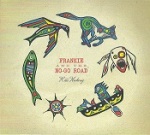 Concept album? Well. I’m not quite sure that’s an adequate description for Rita Hosking’s sixth studio album, “Frankie and the No-Go Road”. You can just take it at face value as a collection of twelve beautifully-crafted songs, delivered with stripped-back folk/Americana arrangements and a striking, sometimes fragile but always impassioned, voice; it’s all of those things but it’s much more as well. The album takes the popular mythological theme of the questing hero and weaves this through the fabric of our journey through life while interleaving mystical and mythological references from various cultures. Each of the songs has a subtitle relating to the progress of the mythological hero, Frankie (whose gender isn’t specified) through their heroic quest.
Concept album? Well. I’m not quite sure that’s an adequate description for Rita Hosking’s sixth studio album, “Frankie and the No-Go Road”. You can just take it at face value as a collection of twelve beautifully-crafted songs, delivered with stripped-back folk/Americana arrangements and a striking, sometimes fragile but always impassioned, voice; it’s all of those things but it’s much more as well. The album takes the popular mythological theme of the questing hero and weaves this through the fabric of our journey through life while interleaving mystical and mythological references from various cultures. Each of the songs has a subtitle relating to the progress of the mythological hero, Frankie (whose gender isn’t specified) through their heroic quest.
But before we go any further, let’s hear it for the guys in the band; Rich Brotherton (playing virtually everything plus production and backing vocals), Glen Fukunaga (upright bass), Don Wynn (drums, percussion), Sean Feder (dobro, djembe), Kora Feder (harmony vocals) and Andy Lentz (violin) supply masterfully understated backing for Rita’s guitars, banjo, harmonica and vocals, creating an understated soundscape that evokes “Harvest” and “After the Goldrush” and perhaps the austerity of Springsteen’s “Nebraska”.
The opening songs “A Better Day” and “Wetiko” set the scene for the album; “A Better Day” is a delicate exposition, gently identifying a malaise in the writer’s life and creating the link with fictional hero Frankie. Rita’s voice, with a hint of vibrato, and the mournful harmonica create an aura of melancholy which is crying out for resolution. “Wetiko” identifies the malaise with the Native American concept of a parasitic psychosis, devouring the individual from within, relying on a sparse banjo/drums/bass arrangement to evoke menace and malice. As the album progresses the two narrative strands are woven ever tighter with episodes of denial (“Magic Carpet”) and resolve (“I See Storms”) before the quest reaches its crisis.
“Black Hole”, with its hints at a support group meeting and “Mama Said” reveal that the demons are within and always have been. The telling image is that of a dog dying of thirst but afraid to drink because of his reflection in the water in “Mama Said”; once that fear is overcome by a leap of faith, then the journey becomes easier. The quest continues with the hazardous journey home, challenges to the outcomes, and a sharing of the lessons learned in “Sing” which finally reunites the two narrative strands with a simple solution; put your faith in the natural world and express yourself freely.
“Frankie and the No-Go Road” is a fascinating and haunting piece of work; the instrumentation is sparse and the vocals powerful, yet simultaneously vulnerable, pulling us in to two narratives linking the inner and outer worlds. It’s an ambitious concept, but the deliberate musical understatement and complexity of the narratives and themes create a tremendously satisfying album which occupies the mind long after the last notes fade away.
“Frankie and the No-Go Road” is released in the UK on Friday October 30th.


